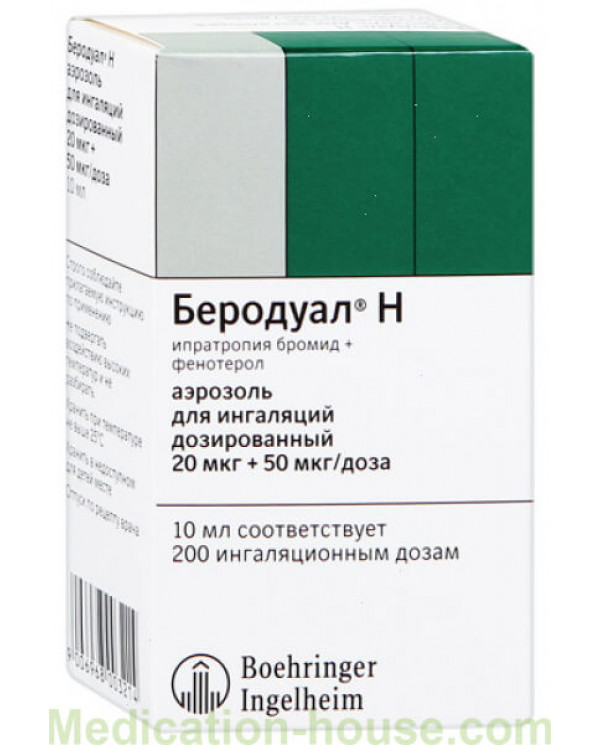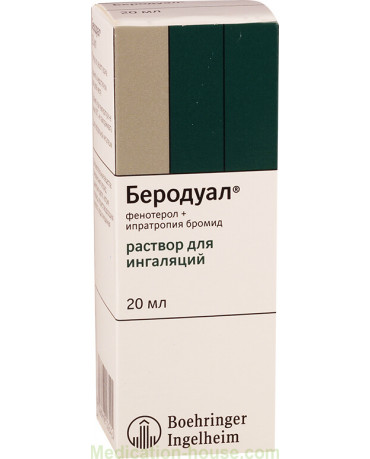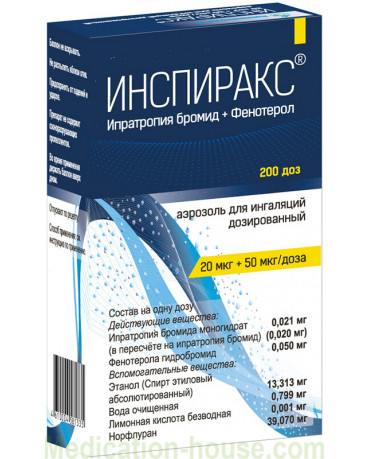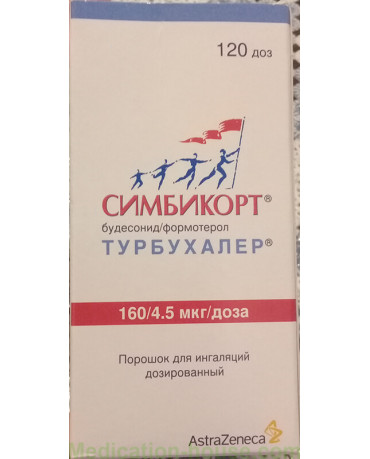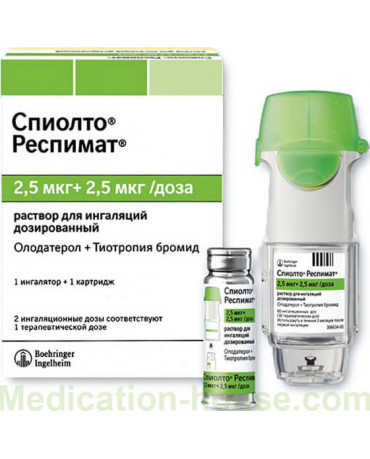Berodual N user manual
Reed more and buy Berodual N here
Berodual N is a bronchodilator drug of improved bronchodilator action with minimization of side effects due to the combination of the active substances of the m-anticholinergic antagonist and β2-adrenergic agonist.
Release form and composition
The dosage form of the drug is a metered-dose aerosol for inhalation: a clear, colorless or slightly brownish or yellowish liquid, free of suspended inclusions (200 doses (10 ml) in a metal can with a mouthpiece and a metering valve, 1 can in a cardboard bundle).
1 dose of aerosol contains:
Active substances: phenoterol hydrobromide - 50 mcg, ipratropium bromide - 20 mcg;
Auxiliary components: absolute ethanol, citric acid, 1,1,1,2-tetrafluoroethane (propellant HFA 134a), purified water.
Indications for use
Symptomatic therapy and prevention of obstructive respiratory diseases with reversible bronchospasm:
Bronchial asthma;
Chronic obstructive pulmonary disease (COPD);
Chronic bronchitis, uncomplicated or complicated by emphysema.
Contraindications
Absolute:
Tachyarrhythmia;
Hypertrophic obstructive cardiomyopathy;
Pregnancy (I trimester);
Children's age up to 6 years;
Hypersensitivity to atropine-like substances;
Hypersensitivity to any of the active or auxiliary components of the drug.
Relative (Berodual N should be used with caution under close medical supervision due to the high risk of side effects):
Arterial hypertension;
Hyperthyroidism;
Hypertrophy of the prostate gland;
Angle-closure glaucoma;
Coronary insufficiency;
Cystic fibrosis;
Recent myocardial infarction;
Inadequately controlled diabetes mellitus;
Obstruction of the neck of the bladder;
Severe organic diseases of the cardiovascular system;
Pheochromocytoma;
Children over 6 years old.
Dosage and administration
Berodual N is used by inhaling a dose of aerosol through the mouth.
The dosage regimen and the number of inhaled doses are set individually.
In order to stop attacks of bronchial asthma, adults and children over 6 years of age inhale 2 inhaled doses. If breathing relief does not occur within 5 minutes, 2 more inhalation doses are allowed.
You should immediately consult a doctor if, after 4 inhalation doses, there is no therapeutic effect and additional inhalations are necessary.
The use of metered-dose aerosol Berodual N in childhood is permissible only if the drug is prescribed by a doctor and adults can control the inhalation process.
For long-term therapy with breaks at one time, 1-2 inhalations are recommended, on average 1-2 inhalations 3 times a day; the maximum daily dose is up to 8 inhalations.
The attending physician should instruct the patient on the proper use of the aerosol spray can.
Before the first use of the drug, you must double-click on the bottom of the spray can.
The rules for using metered-dose aerosol, which should be observed with each use of the drug:
Remove the protective cap;
Exhale slowly and deeply;
Grasp the mouthpiece with your lips, holding the balloon in the direction of the bottom up;
Inhale as deeply as possible, while simultaneously quickly pressing the bottom of the balloon until the first inhaled dose is released; hold your breath for several seconds, then, taking the mouthpiece out of your mouth, slowly exhale (to get the second inhalation dose repeat the procedure);
To put on a protective cap;
Before using the drug after a break between inhalations of 3 days or more, the bottom of the balloon should be pressed once until an aerosol cloud appears.
The container contains 200 doses, after their use, the container must be replaced, even if some content remains in it, since further inhalation reduces the amount of drug released. Due to the fact that the balloon is opaque, the amount of aerosol in the balloon is determined by the degree of immersion (without cap) in a container of water.
The mouthpiece must be kept clean, it is recommended to wash it if necessary in warm water with soap or detergent, and then rinse thoroughly with clean water.
The plastic mouthpiece is specially designed for the drug Berodual N and is necessary for accurate dosing of the aerosol. It cannot be used with other metered-dose aerosols. Also, do not use Berodual N. metered-dose aerosol with other mouthpieces.
Side effects
Central nervous system (CNS): often - nervousness, small tremor of skeletal muscles; sometimes - dizziness, headache (mainly in patients with aggravating factors); isolated cases - changes in the psyche;
Cardiovascular system: sometimes - a feeling of palpitations, tachycardia (mainly in patients with risk factors); rarely (when using high doses) - increased systolic blood pressure (BP), decreased diastolic blood pressure, fibrillation, arrhythmia, supraventricular tachycardia;
Respiratory system: sometimes - local irritation (pharyngitis), cough; rarely - paradoxical bronchospasm;
Water-electrolyte balance: sometimes - severe hypokalemia;
Digestive system: often - a feeling of dry mouth; sometimes nausea, vomiting; rarely - reversible pathology of motility of the gastrointestinal tract (diarrhea, constipation);
Organ of vision: rarely - mydriasis, reversible disturbance of accommodation, angle-closure glaucoma, increased intraocular pressure, pain in the eyeball;
Allergic answers: rarely - angioedema (tongue, lips, face), skin rash, urticaria, laryngeal edema, laryngospasm, anaphylactic shock;
Other: possible - weakness, increased sweating, cramps, myalgia; rarely - urinary retention (reversible).
Aerosol overdose Berodual N is mainly associated with the action of phenoterol (excessive stimulation of β-adrenergic receptors) and is accompanied by the following symptoms: tachycardia, palpitations, tremors, arterial hypo- or hypertension, increased pulse pressure, angina pectoris, arrhythmias, hot flashes, metabolic acidosis, hypokalemia.
The second active component of the aerosol is ipratropium bromide, due to a wide range of therapeutic effects and an inhaled method of application, overdose symptoms, such as a disturbance in the accommodation of the eyes and a feeling of dry mouth, are usually mild and transient.
In order to eliminate the symptoms of an overdose, the use of the drug should be discontinued, it is also necessary to take into account the data of blood acid-base balance analyzes. Tranquilizers, sedatives, and, in difficult situations, intensive care are indicated.
As a specific antidote, the use of β-blockers (preferably β1-selective blockers) is allowed. However, it is important to remember the possibility of increasing bronchial obstruction under the influence of β-blockers, and carefully select a dose for patients with COPD or bronchial asthma due to the risk of severe bronchospasm, which can lead to death.
special instructions
In case of unexpectedly rapid intensification of shortness of breath (difficulty breathing), you should immediately consult a doctor.
Special instructions for the use of Berodual N aerosol in the following conditions / diseases:
Hypersensitivity to the drug: after aerosol inhalation, an immediate hypersensitivity reaction may occur, the symptoms of which (in rare cases) are: angioedema, urticaria, rash, oropharyngeal edema, bronchospasm, anaphylactic shock;
Hypersensitivity to auxiliary components: the stabilizer (disodium edetate dihydrate) and preservative (benzalkonium chloride) contained in the aerosol in sensitive patients with airway hyperresponsiveness can cause bronchospasm;
Hypokalemia: as a result of the use of β2-adrenoreceptor agonists, the concentration of potassium ions in the blood may decrease;
Gastrointestinal tract (GIT): when using aerosol Berodual N, gastrointestinal motility may be impaired if the patient has a history of cystic fibrosis;
Organ of vision: the drug is prescribed with caution when the patient is predisposed to the development of glaucoma. In some cases, the following complications were reported: eye pain, mydriasis, increased intraocular pressure, angle-closure glaucoma, which developed from contact with the eyes of inhaled ipratropium bromide (or ipratropium bromide in combination with β2-adrenergic agonists). As a result of conjunctival injection of the vessels of the eye, the formation of symptoms of acute angle-closure glaucoma is possible: blurred vision, discomfort or pain in the eyes, appearance of colored spots or halo in front of the eyes in objects in combination with redness of the eyes and corneal edema. With any combination of these symptoms, eye drops should be used to reduce intraocular pressure, and consult a specialist immediately. Patients with a predisposition to glaucoma should take special care to protect their eyes;
Paradoxical bronchospasm: Berodual N, like other inhaled drugs, can cause life-threatening paradoxical bronchospasm, with this reaction, you should immediately stop using the drug and switch to alternative treatment methods; the appointment of other sympathomimetic bronchodilators simultaneously with Berodual N aerosol is allowed only under medical supervision;
Paradoxical bronchospasm: Berodual N, like other inhaled drugs, can cause life-threatening paradoxical bronchospasm, with this reaction, you should immediately stop using the drug and switch to alternative treatment methods; the appointment of other sympathomimetic bronchodilators simultaneously with Berodual N aerosol is allowed only under medical supervision;
Cardiovascular system: with concomitant therapy with Berodual H serious heart pathologies (arrhythmias, coronary heart disease, severe heart failure), it is important to remember to consult a doctor if there are pains in the heart or other symptoms that indicate a deterioration in cardiac function. Attention should be paid to shortness of breath and chest pain, as these symptoms can be in both pulmonary and cardiac etiology. According to post-marketing studies, rare cases of myocardial ischemia have been reported due to the use of β-adrenergic agonists;
Systemic effects: only after a careful assessment of the risk / benefit ratio, especially if the necessary doses exceed the recommended, Berodual N is prescribed for the following diseases: diabetes mellitus with inadequate glycemic control, recent myocardial infarction, severe organic heart and vascular pathologies, hyperthyroidism, pheochromocytoma, urethra obstruction (for example, prostatic hyperplasia or obstruction of the bladder neck);
Doping tests: Athletes using Berodual N Aerosol should take into account the likelihood of positive test results due to the presence of phenoterol in its composition.
Special instructions for prolonged use of Berodual N aerosol:
Bronchial asthma, mild and moderate forms of COPD: symptomatic therapy is recommended, which may be more effective than regular use;
Bronchial asthma or steroid-dependent forms of COPD: it is necessary to carry out or strengthen anti-inflammatory therapy to control the course of the disease and relieve airway inflammation.
In the case of the systematic use of drugs containing β2 agonists, including Berodual N, in increasing doses for the relief of bronchial obstruction, an uncontrolled worsening of the course of the disease is possible. With increased bronchial obstruction, the usual increase in the dose of β2-agonists, including Berodual N, which is recommended for a long course of therapy, is not only not justified, but also dangerous. In order to prevent a life-threatening worsening of the course of the disease, it is necessary to consider changing the treatment plan with replacing the use of Berodual N aerosol with adequate anti-inflammatory therapy with inhaled glucocorticosteroids.
Drug interaction
Anticholinergic drugs: it is not recommended to use simultaneously with Berodual N for a long time due to the lack of data on the interaction;
β-blockers: can significantly weaken the bronchodilator effect of aerosol;
Other β-adrenergic agonists entering the systemic circulation, anticholinergics, or xanthine derivatives (including theophylline): likely increased side effects; it is also possible to enhance the bronchodilator action of Berodual N;
Halogenated inhalation anesthetics (including trichlorethylene, halothane, enflurane): may enhance the adverse effect of β-adrenergic agents on the cardiovascular system;
Glucocorticosteroids, xanthine derivatives and diuretics: it is possible to strengthen hypokalemia associated with the use of β-adrenergic agonists, therefore, in the treatment of severe forms of obstructive airways diseases, it is recommended to monitor the concentration of potassium in the blood;
Digoxin: hypokalemia associated with the use of β-adrenomimetics can increase the risk of arrhythmias and increase the negative effect on heart rhythm (serum potassium concentration should be monitored);
Tricyclic antidepressants and monoamine oxidase inhibitors: prescribed with caution, since β-adrenergic agonists are able to enhance the action of β-adrenergic agents.
Terms and conditions of storage
Store in a dry, dark place out of the reach of children, at a temperature not exceeding 25 ° C. The aerosol in the cylinder is under pressure. The cylinder must not be heated above 50 ° C and opened.
Shelf life is 3 years.
Terms of sell
You can buy Berodual N without a prescription.

